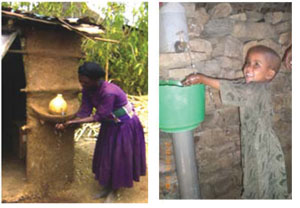21.1 Benefits of hygiene and sanitation behaviour change
In the previous sessions of this Module you have learned that proper hygiene, adequate sanitation and safe drinking water have significant benefits for human health. You have also learned about the need to practise positive behaviours. Any change from bad habits to good practice is described as behaviour change.
When are the critical times for a person to wash his/her hands?
Critical times for handwashing are after visiting the latrine, after cleaning a child’s bottom, before preparing food and before eating meals or feeding children.
Promotion of hygiene and proper sanitation is the single most important way to improve the health of your community (Figure 21.1). However, the right approaches need to be used to change behaviour and get people to take better care of themselves, their family’s health and their environment. As health is an asset to a community, its improvement enhances economic development and brings wealth to a society.
Did you know? A gram of human faeces can contain 10 million viruses and 1 million bacteria.

Learning Outcomes for Study Session 21
